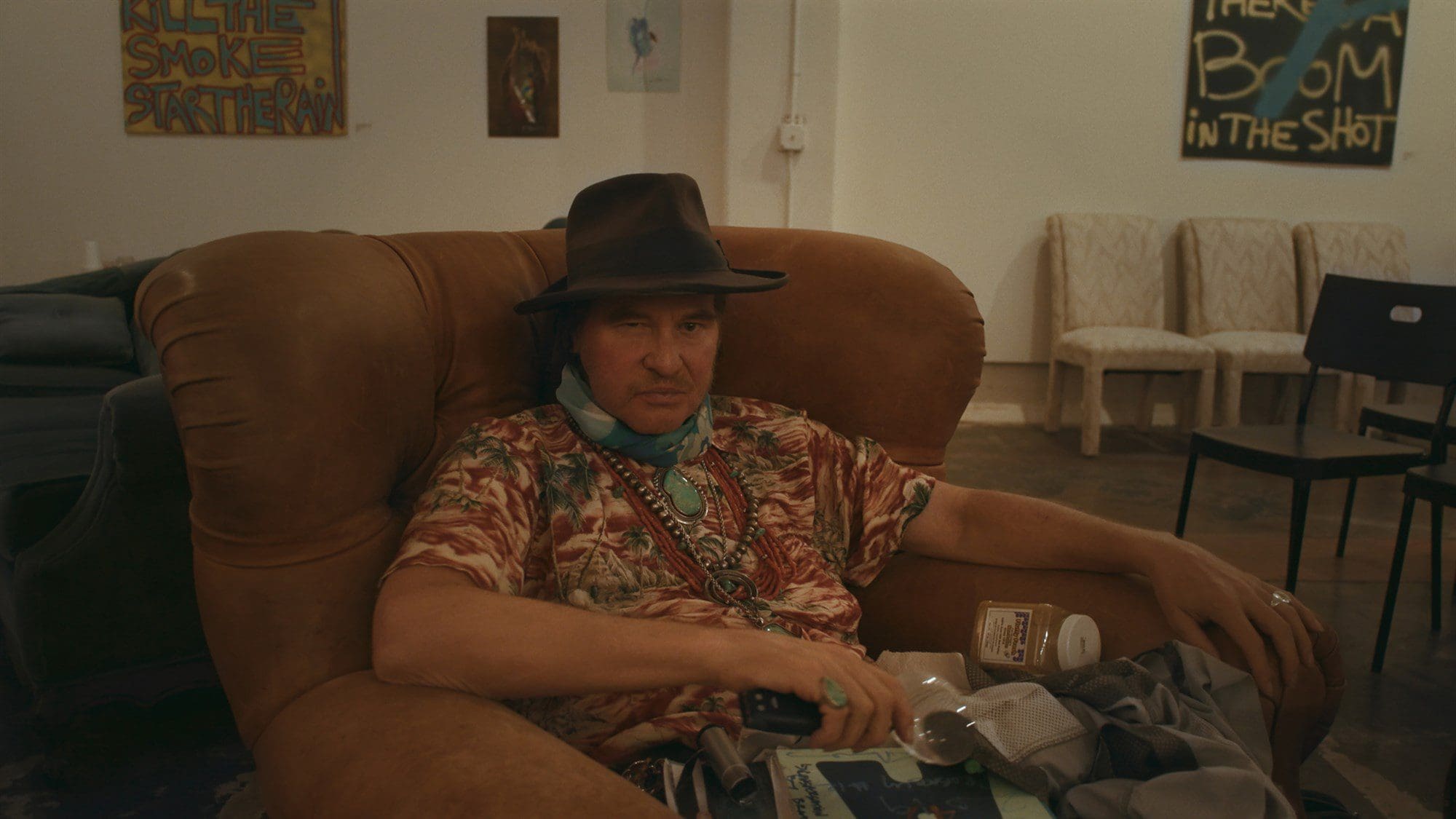
Val Kilmer is an actor who carved out a prominent place for himself in Hollywood–and the forefront of it–for those of us who grew up watching his many iconic portrayals in popular films of the ’80s and ’90s. His immense talent and his artistic appetite for film, combined with movie star good-looks and a charisma uniquely his own, aided his meteoric rise. He has spent his entire life pursuing a career in film, and for over 40 years, recording the process, amassing countless hours of footage from his childhood, through the peak of his career, and even now as he continues to recover from his battle with throat cancer. With the help of directors Ting Poo and Leo Scott, that film was brilliantly crafted and edited into his documentary, Val.
The opening shows Kilmer on the set of Top Gun, joking around with castmates Rick Rossovich and Barry Tubb and discussing if they have ever been fired from a job. Kilmer smiles and mentions that he’s almost fired from every job—an early nod to the notion that he could be difficult to work with. That reputation isn’t glossed over, as he includes interviews on the subject, and footage from the set of The Island of Dr. Moreau (there’s an entire documentary about its disastrous production), which do not paint him in an entirely flattering light. Combine that with inclusion of failed audition tapes, arguments with his ex-wife Joanne Whalley, and some emotional discussions on a multitude of different topics, and you see how the film aims to honestly tell its story.
Kilmer’s son Jack narrates Val, speaking the words written by his father, who has difficulty talking following his cancer treatments. In discussing the honest storytelling, he says in summary, “I have behaved poorly. I have behaved bravely. I have behaved bizarrely to some. I deny none of this and have no regrets because I have lost and found parts of myself that I never knew existed, and I am blessed.”
Kilmer could likely craft a massively entertaining documentary with just the behind-the-scenes footage of himself and fellow actors on the sets of his most well-known films, and while there is some of that, it’s clearly not his main objective. It would be great if a bit more were incorporated, and anyone interested in this film would certainly be on board for the longer runtime, or even a docuseries including it all.
That said, Kilmer clearly knows the image of him that people have in their heads and when you see him write out “Iceman” on paper, and the theme to Top Gun begins to play, you are thankful that it’s one of the few films he didn’t gloss over. There is some great material of him showing up to the set on the aircraft carrier, and fooling around with the cast. He also discusses coming up with a backstory for his character, and how director Tony Scott kept him and Tom Cruise apart to create a rivalry on screen. It’s nuggets like this that movie lovers are really going to be enthralled by.
A large portion of Val instead focuses on his personal life and more intimate home movies. From his time growing up on the old Roy Rogers ranch with his equally creative brothers, difficult family dynamics, and, ultimately, his health struggles. It includes the tragic death of his creative brother, Wesley, at just 15 years old, and how Kilmer carried that with him throughout his career, becoming the youngest person accepted to drama school at Julliard, and seeking out interesting character roles.
It also includes audition tapes he made for Stanley Kubrick and Martin Scorsese. While those attempts weren’t successful, Kilmer’s passion led to his roles as Jim Morrison in The Doors, and as Doc Holliday in Tombstone, a performance that deserved a Best Supporting Actor nomination if any ever did. It is that role for which he is likely most beloved, and its’ at a fan event for it where he candidly discusses struggling with the idea of selling a former version of himself. In meeting fans, he finds a feeling of gratitude rather than humiliation, but it clearly can take a toll.
Powerful intercuts between highpoints of his life and career with those in which he’s struggling and vulnerable are impeccably placed throughout the film. A transition from his performance as Batman, to becoming ill during an event signing is done with great humility. While quick cuts of old footage he took during visits to his mother’s home in New Mexico, mixed with that of his more recent trip for her funeral, are subtler, and especially moving, accompanied by the musical composition of Garth Stevenson.
Kilmer closes his film discussing the parallels between his own life and that of Mark Twain, the subject of the passion project he was working to bring to life just before his cancer diagnosis. While his dream of bringing that tale to the screen may no longer be a reality as he originally envisioned it, he has accomplished something truly meaningful with his own story.
Kilmer wanted to tell the story of what it means to be an actor with Val, not simply show highlights of his career in a braggadocious fashion. He accomplished this by showing how the most important personal moments of his life that existed during, and impacted his work in both positive and negative ways, helped to shape him as Val the performer, and as Val the man.

